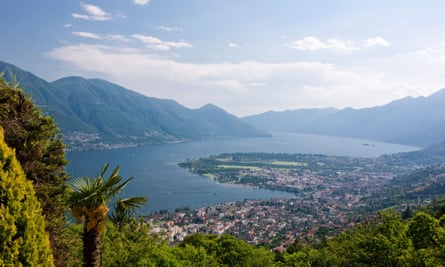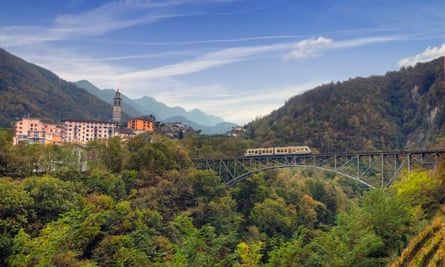
Frequent Eurocity trains dash north from Milan via the Simplon Tunnel to Switzerland. On the way to the tunnel, those express trains speed by Lake Maggiore, affording fine views of the Borromean Islands. For Switzerland-bound trains, the last station stop in Italy is at the small Piedmont town of Domodossola. The station here is remarkably grand, as befits what was once an important gateway into Italy, with all the paraphernalia of customs and immigration. From Domodossola, it is just another half-hour through the Simplon Tunnel to Brig, an appealing Swiss town that guards the northern end of the Alpine tunnel, before trains head on to Berne, Basel and the north.
If you don’t mind missing the gorgeous scenery around the Swiss-Italian border, then travelling via the Simplon Tunnel route into Switzerland is fine. Simplon darkness is no different from the darkness on the London Underground, though the Eurocity trains that ply the Simplon route are far more comfortable than anything the tube has to offer. But those not in a hurry can do much better by turning right at Domodossola, then heading east into the hills to find a beautiful back-door route into Switzerland by using a cross-border rural railway.
Into the hills
“Turning right” at Domodossola means heading down from the main station to a subterranean platform from which the train to Locarno departs. It’s a curiosity of this mountain railway that both terminuses are underground, but the intervening 30 miles offer a feast of fine scenery and no long tunnels at all. Indeed, some argue that the line east from Domodossola is on a par with the celebrated Bernina railway, which is the only other narrow-gauge railway crossing the Italian-Swiss border.
The minor railway from Domodossola is called the Vigezzina, though over the Swiss border it is more commonly called the Centovalli. Two companies – SSIF on the Italian side and the evocatively named Fart in Switzerland – cooperate to run about nine trains a day from Domodossola to Locarno. The journey takes just under two hours on a rollercoaster route through rugged Alpine terrain. The Swiss border is about two-thirds of the way along, and from here the railway crosses into Switzerland before dropping down to Locarno on the eastern limb of Lake Maggiore.
On boarding I am surprised to find a welcoming brigade of black-clad chimney sweeps on their way to a convention at Santa Maria Maggiore, the highest village on the rail route to Locarno. As we rattle out from Domodossola’s underground station into the sunshine, some of the spazzacamini tell me how the annual trip to Santa Maria Maggiore is a homecoming ritual.
“It’s a chance to go back to communities in the hills which sent chimney sweeps out to the farthest-flung parts of Europe,” says a freckle-faced young woman in the standard black professional attire. I make a mental note to learn more about the history of chimney sweeps then focus on the passing landscape as we climb in a series of spectacular zigzags up through tiny Creggio to Trontano and beyond. The railway quickly gains height to follow the southern flank of the Melezzo valley, then drifts back down to the valley floor. There are neck-craning views back to the Pennine Alps behind Domodossola, but the real landscape stars are closer to hand: a gorgeous mix of oak and chestnut woodland interspersed with mountain streams and fleeting glimpses of handsome villas.
The pilgrim trail
Our train pauses for no evident reason at Marone, a tiny place in the middle of a forest a few miles east of Trontano. The neat station building has green shutters. I have an Adlestrop moment, the scents and sounds of this Piedmontese outpost replacing the willow-herb and blackbird of Edward Thomas’s poignant poem. There are cheery goodbyes from the chimney sweeps at Santa Maria Maggiore, from where it is generally downhill all the way to Locarno. But this is a journey of many moods and dramatic changes in landscape. Light drizzle sets in as we approach Re, where a party of nuns (and I) all leave the train. The rain doesn’t deter me from making a stop to walk through beechwoods and visit the Santuario della Madonna del Sangue, a pilgrimage location since 1494, when a fresco of the Nursing Madonna was hit by a stone and started bleeding.
Joining a later train at Re for the onward journey to Locarno, I am asked to pay a supplement of €1.50. “It’s only levied on these Vigezzo Vision trains with panoramic windows,” says the train manager. Given that we are surrounded by rain and drifting banks of low cloud, this seems a little cheeky, but I pay up and am happily rewarded by the return of the sun and a fine rainbow as we cross into Switzerland’s Ticino canton.
after newsletter promotion
Ticino style

From the border it is another 40 minutes down the valley to Locarno; it’s a journey with jaw-dropping precipices, spectacular ravines and some adventurous bridges over the myriad side valleys that inspired the name Centovalli (100 valleys). Yet as we approach Locarno there is a sense of returning to tamer terrain, and the luxuriant vegetation that contributes so much to the character of Switzerland’s southernmost canton. We glide past orchards and vineyards, and as we approach Locarno there are ornamental palms. Suddenly, with a toot on the train’s horn, our Vigezzo Vision train plunges into a mile-long tunnel that leads into the subterranean terminus.
I stay overnight in Locarno and next day take the wonderful Treno Gottardo via the classic Gotthard line to Basel, a route that (in the reverse direction) featured in 2022 as a Guardian rail route of the month.
The direct Eurocity via the Simplon Tunnel links Milan to Basel in just over four hours. But to make the most of the journey, turn right at Domosossola and follow this remarkable mountain route. Milan to Basel via the Vigezzina and Treno Gottardo takes twice as long, but it offers a close engagement with Alpine landscapes and is much more rewarding – slow travel at its best.
Travel facts
If you are making this journey as part of a wider tour of Europe by rail, your best option is probably an Interrail pass: four days’ travel within a month costs from €283 (discounts for youths and seniors). Tickets from Domodossola to Locarno can be bought at the station and cost €20, allowing one stop along the way (the €1.50 supplement for the Vigezzo Vision trains is payable by all travellers, regardless of length of journey and kind of ticket). Timetables and more information about fares are at vigezzinacentovalli.com. Santa Maria Maggiore has a chimney sweep museum: the Museo dello Spazzacamino.
Nicky Gardner is co-author of Europe by Rail: The Definitive Guide: the 17th edition will be available from the Guardian Bookshop from mid-February, and signed copies are available direct from the publisher.



